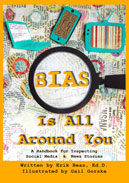
 |
Bias Is All Around You: A Handbook for Inspecting Social Media & News Stories
by Erik Bean, Ed.D.
Healthy Mind Express
Across the political spectrum, one of the most common ways to discredit a media outlet or individual is to accuse them of bias. However, as author Bean shows, bias is not just a failing of the other side. Instead, the current media and political landscape is chock-full of it. His book explains the forms bias takes, its prevalence across social media, and the stakes involved for individuals and societies. Most importantly, Bean offers tools for spotting and countering bias. The book starts by clearly defining bias and the critical thinking that can counter it. Next, it details various strategies for detecting and evaluating bias, including examining the credibility of sources, rhetoric, writing style, and journalistic ethics. Later chapters summarize the damaging effects of social media algorithms and the various logical fallacies that can distort thinking. The book ends by relating its topic to modern events, including the COVID-19 pandemic, the 2020 presidential election, and the war in Afghanistan.
This book stands out not only for its clarity and relevance but also for its inclusion of useful resources for avoiding bias. For example, Bean suggests evaluating bias through "KLEMP," or the ancient Greek rhetorical concepts kairos, logos, ethos, mythos, and pathos. He also lists and defines logical fallacies common to biased thinking, such as hasty generalization, ad hominem, and red herring. The book can be read in one sitting, and it would be of interest to anyone looking to consume media more responsibly. Moreover, its many worksheets and checklists could be adapted for use in high school and college classrooms. The book's final appeal for greater media literacy and civil discourse could not come at a more critical time, and the tools it presents are a first step toward achieving those goals.
RECOMMENDED by the US Review